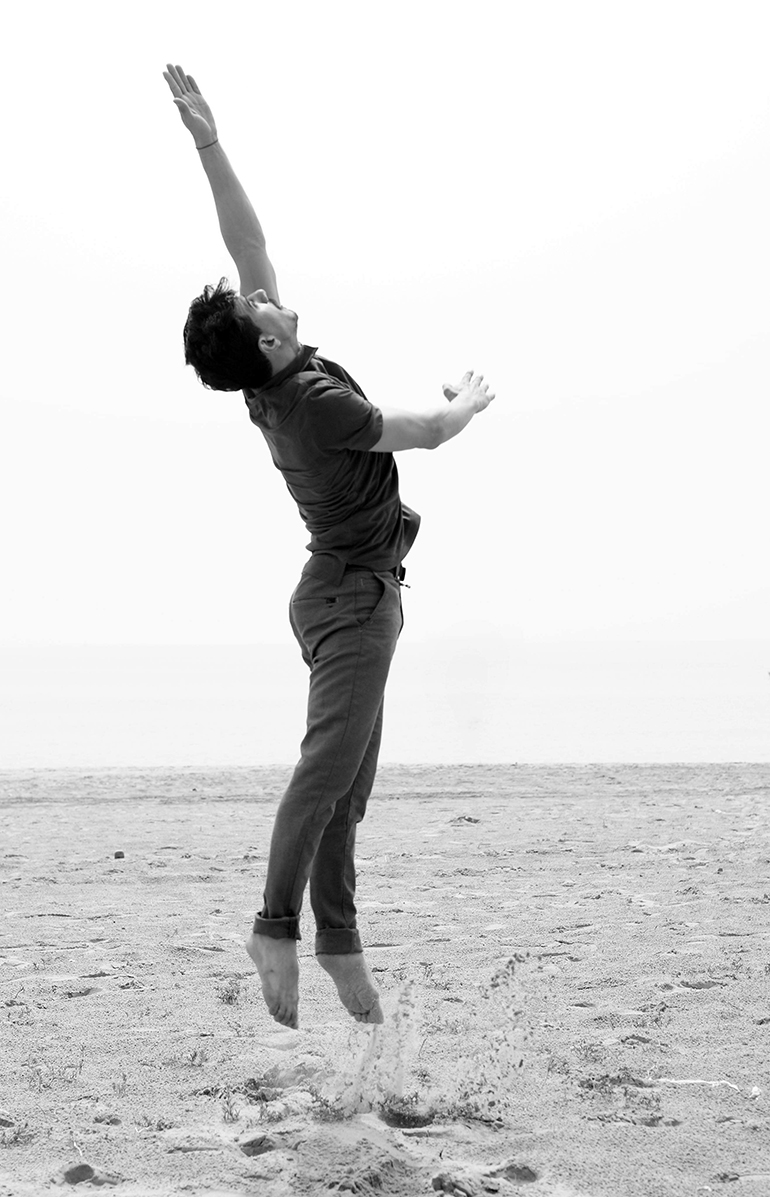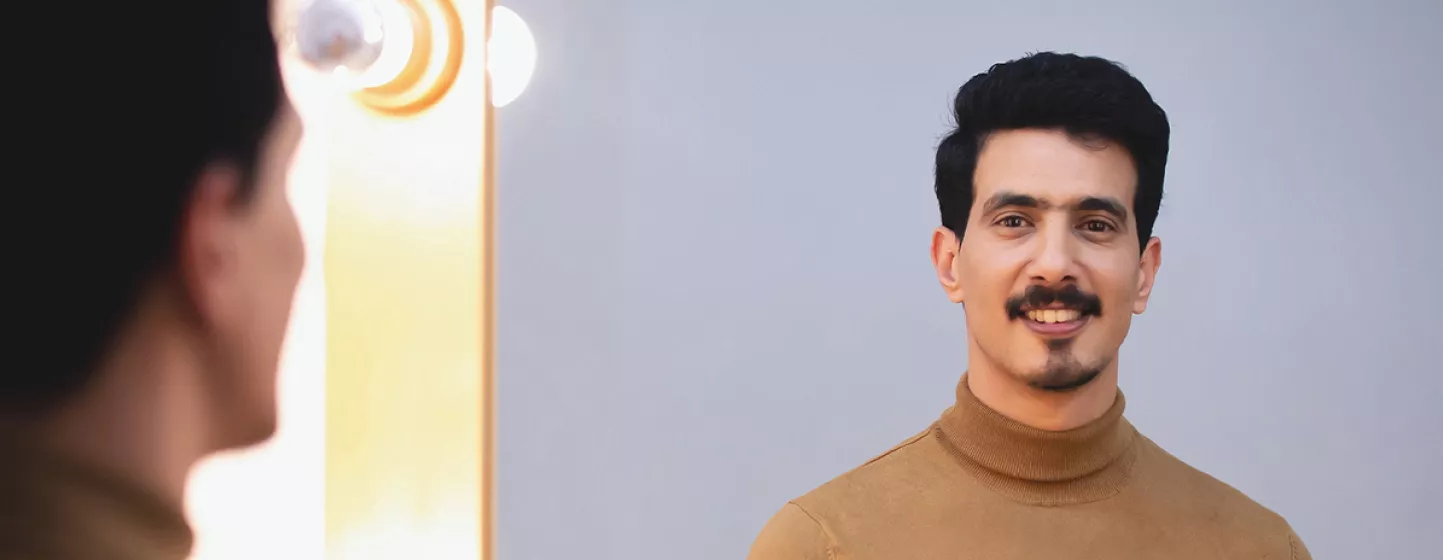Exploring the health benefits of dance with Hamdi Trabelsi
36-year old Hamdi Trabelsi, who is a qualified pharmacy technician, ultimately chose to pursue a career in dance, his childhood passion. He is not only a dancer and choreographer, but also the founder and artistic director of CATdanse, a community of Tunisian artists.
Profile by Emmanuel de Solère Stintzy.
He wanted to conduct a walking interview, which almost instantly confirmed our suspicions that the Tunisian dancer, Hamdi Trabelsi, is a man of movement. We met with the founder and artistic director of CATdanse shortly after the official launch of the project's website and he explained with much gesticulation: "We wanted to establish a community of Tunisian artists and a platform for promoting their work, as no-one stands a chance on their own! 44 dancers, 15 choreographers and 43 dance schools are now featured on the platform. It's certainly something to be proud of!"
The platform showcases five dance styles: ballet, modern, folk, hip-hop and break dance. Users can access archives of past work and find out where the artists are currently performing and what they have planned for the future. The project's managing director, Oumayma Khikhia, who also happens to be Hamdi's wife, explains: "Some artists took a bit of convincing as they had a hard time believing that they would be able to boost their visibility and renown. It was thanks to Hamdi that I discovered the world of dance, which brings together several other art forms such as music".
"A lover of dance"
Hamdi Trabelsi's passion for dance came to the fore when he was 10 years old: "I started with headstands on the beach with my dad, then I went to a youth centre to break dance. I loved break dance. You have to be strong and up for a challenge to be a breaker. There are moves that are difficult to master, but when you do, they look incredible."
His older brother Ali reminisces: "I still have Hamdi saved in my phone as ‘B boy’, like a rapper. He found dance in our neighbourhood. Kids used to break dance to American and French rap. It's a very physically demanding style of dance with real health benefits, almost as beneficial as athletics according to our mum."
Initially, however, Hamdi's family would have been happier to see him using his pharmacy technician qualification, which he obtained from the Institut Tunisien de Santé [Tunisian Health Institute] in 2013, to look after his health and that of others. "My family told me that I would never be able to make a living from dance, but it was all I ever thought about despite the fact that pharmacy also allows us to take care of our bodies." Hamdi competed in amateur competitions and then, starting in the early 2000s, took eight years of dance lessons at the Centre Méditerranéen de la Danse Contemporaine [Mediterranean Centre for Modern Dance] in Tunis and completed short-term apprenticeships at the Centre National de la Danse [National Dance Centre] in Paris. His first real insight into the world of professional dance came during a world tour with Imed Jemâa, a pioneering Tunisian modern dancer and choreographer: "Around twenty years ago, Hamdi danced in Rojla, one of my shows. He was an excellent hip-hop dancer and a lover of dance. He gave more than just a physical performance, he allowed the audience to understand the choreography and follow the storyline."
France, Poland, England, South Africa, Brazil, Hamdi Trabelsi has been touring the world ever since. Today, he is a dancer for the Tunis Opera Ballet and choreographer for his namesake company. He trains every day "ensuring that he remains entirely focused and doesn't become complacent". He is unable to sit still as he explains: "Everyone knows that dance clears your body of negative energy, the physical grounding it enables is like a chakra" (Editor's note: vital energy centres within the body).
A choreographer with a message to share
As a choreographer, Hamdi creates original pieces. His older brother Ali respects the path little "B boy" has taken: "When I see his shows, he is in another dimension, one of pure professionalism! They are almost theatrical in nature and cover poignant topics such as poverty and banditry. Dance provides a window into what we experience every day in our working-class neighbourhoods." Hamdi, who choreographed two shows in 2021 (Deep and P'tit café [lil café]) and is preparing a show featuring four women entitled Bloom, summarises: "When it comes to modern dance, we are messengers who give the audience a chance to see and interpret their daily lives differently." Thanks to CATdanse, which is supported by CFI, Hamdi Trabelsi has established Seven 8 prod, an artistic production and broadcast company, of which he is the director. He now calls himself a "cultural entrepreneur".
So, now that the platform is live, is the project finished?
Hamdi gesticulates broadly with both arms: "We have very ambitious dreams for what comes next! Thanks to the CATdanse platform, we hope that government departments and those organising festivals will recognise and value the work of dancers. We also hope to create more videos and take the artists to different regions of Tunisia, but that all requires resources."
Both "excited and anxious" about the scale of the challenges that await him, Hamdi Trabelsi smiles and gets to his feet in one final swift and graceful movement.

In 10 years...
Hamdi's wife, Oumayma Khikhia, is confident in her response. Firstly, there is absolutely no chance that you'll find my husband behind a pharmacy counter in 10 years' time: "He enjoys the sciences, but he has always preferred dance! It is a way to express himself. As a choreographer, he is known as "coach", as he is always seeking perfection. In 10 years, he will certainly have succeeded in bringing together all African artists on the CATdanse platform."
Ali Trabelsi, Hamdi's older brother, sees him "opening a dance school that brings together all the styles of dance present in Tunisian culture." Imed Jemâa, dancer and choreographer, advises Hamdi to "rework choreography and promote other dancers. We have always had excellent young dancers in Tunisia, but while they have access to resources for choreography, they lack opportunities to receive training and obtain official qualifications."
Hamdi Trabelsi seems to be aware of all of this: "Even at 90 years old, a dancer is still a dancer! But we have to leave room for a new, more spritely generation. As a choreographer, I would like to provide an opportunity for young dancers to show what they can do. The CATdanse platform could give us an opportunity to work across the continent, or even the world, with an international festival. I don't know a single artist who doesn't want to show what they can do.
